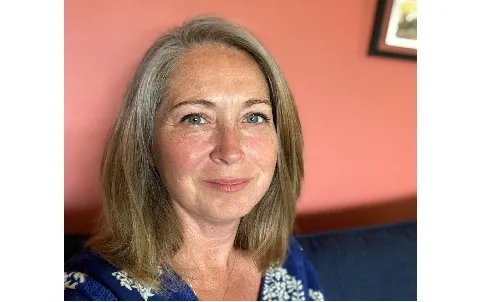
It’s no surprise that TCID Principal Instructor Baye Herald won a CU System award for creating Technical Communication Across the Professions, an Open Educational Resource (OER) textbook. She’s been innovating her entire career. In fact, the award is the capstone for many years of work helping people at UCCS become excellent teachers.
Those years of work began in 2008 when Baye joined the UCCS faculty, teaching professional and technical editing and writing courses; she also served as Director of the Professional & Technical Writing Program from 2016-2019. Baye was a instrumental in developing the fledgling TCID program and works annually with community and international partners to develop service-learning opportunities for her TCID courses, like her Trans-Atlantic and Pacific Project that pairs UCCS students with Italian students to work together on translating and editing Italian-language articles.
In addition, Baye is a Faculty Resource Center (FRC) Fellow, giving her the opportunity to further innovate and teach beyond the classroom. In this role, Baye helps teachers learn the best ways for integrating multiple types of instruction and technologies into their courses. For example, how instructors can help students avoid cognitive overload in hyflex teaching while themselves not becoming overwhelmed by producing content, managing complex technologies, and still addressing the needs of students, all in the post-COVID world.
On top of all this, Baye is also a Daniels Ethics Initiative Fund Fellow. Daniels Fund Ethics Fellows “champion ethics in their discipline and promulgate the outcomes of his or her project through publication, teaching, and public discussion” through incorporating ethics in their curriculum, attend Daniels Fund ethics events, present at ethical workshops and more. Baye’s experience as an ethics Fellow has led her to consider ethics in her own teaching and integrate it into that award-winning OER Book.
“It really makes you think, how am I, as an instructor, bringing the study of ethics into my class or into the program that I teach? What can I do to make this a focal point that people and students want to talk about and engage with?” said Baye.
The OER textbook came from Baye’s desire to develop a curriculum resource that was up to date, incorporated universal design, and easily accessible. She collated resources from other books, scoured the internet for relevant content, and created her own material to ensure that the book was just right for UCCS students.
“I really wanted a resource for my students that was free and available to access on the first day of class,” she emphasized.
Baye’s innovation in the OER field isn’t just from her textbook itself, but how she structured the process of creating it as well. She brought students Joshua Ferguson and Sam Malone into the editing portion of the book, giving them part-time jobs and hands-on experience while receiving student assistance and perspective on the project.
“When I brought students into the process, it turned something that felt like work into something that just felt fun,” said Baye. “I was so glad I made the choice to bring them in and work with them.”
Participating in the process gave the students not only that editing and work experience but came with other benefits as well, with Joshua Ferguson receiving an OER Champion award for being a key collaborator in the editing and Sam Malone using the experience to help secure a job offer.
“I can’t think of a better result than helping a student get a job,” Baye laughed.
Another innovative benefit to the OER is the flexibility and options the platform allows for. Exercises and dynamic content, such as surveys and quizzes, can be added and interacted with and the textbook can be continuously edited and updated, giving Baye the ability to add and change material as industry standards and practices evolve.
“That’s the great thing about it, I can go in and edit and change things,” said Baye. “As I change the class, I will change the book.”
That’s the real trick of OER books: increasing opportunity and access for students while ensuring the content is the most current and relevant possible.
Though the bulk of Baye’s work on the OER textbook is behind her, the process proved to be more intensive than expected. Baye originally thought it would take about a year to pull the book together, but the actual timeline ended up being about four years after she started around 2018. This didn’t stop Baye from completing her book or continuing to work on bringing OER to students, as she’s now helping peer review another OER textbook in her FRC role.
Despite her already many hats as FRC Fellow, Daniels Fellow, parent, Principal Instructor, innovator and more, Baye wears one more that may surprise you – tap dance enthusiast.
“I’ve a life-long love of tap dancing, and with no time for taking classes lately, I’ve been tap dancing at home. It’s been great!” laughed Baye.